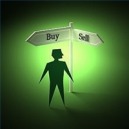byrongiffy
Business Today
The Stock Market

We live in a time where things seem very unpredictable. Many people are unsure what to do with their time and money and it can be a difficult thing to know who to trust. We are hoping for a wonderful economic change for the better to come our way, but that change does not seem to be coming quickly enough. In a market where everyone is trying to save money and people are doing everything they can just to stay afloat, it makes it difficult to enjoy the good things in life and set aside the worries that we must face all the time.
Competitiveness
As we learned in "The World is Flat", things are not going to get any easier in the way of competition. We are facing challenges now that were never thought possible before. There are people in India and China who are able to do the same work from their country, half-way around the globe, as we are able to do here and they do it for a fraction of the price that we are able to work for. So how do we compete with this? Steve Strauss, a columnist for USATODAY, offers us a few suggestions here:
1. Remember what business you are in. Whether you are a computer programmer or a window-washer, if you own a service business, remember that you job is to SERVE. These days, there is no shortage of competition; clients can go across the street, or potentially, across the globe, depending on the business. So it is the company that serves their clients best that will emerge victorious.
Remember: Not every business decision you make is based on getting something for the least amount of money, and the same is true for your customers.
2. Offer multiple services: Offering products or services that a foreign competitor cannot is another way to distinguish yourself. Think Starbucks: Coffee in the winter, slushy drinks in the summer, and music and a groovy atmosphere year round. You too need to create multiple profit centers.
3. Form strategic partnerships: By creating a team around you of symbiotic businesses, you can, collectively, bid on bigger projects, market yourselves to new audiences, and work on projects you could not do alone.
(http://www.usatoday.com/money/smallbusiness/columnist/strauss/2006-07-09-compete_x.htm)
Social Trends that are Affecting Business

One big business idea that has been becoming popular over the past few years is business plans that will cater to the needs of the "baby boomers". Since there are so many baby boomers (people ranging from age 46 to 65) there is going to be a need for an increase of services that will cater to these people in the near future. They are all soon going to be reaching retirement age, they will want to go on cruises and other vacations, collect retirement money, buy old people cars, etc. Also, in a few more years these old people are going to need some retirement homes and they they are going to die and there will be a lot of funerals happening and so on. There will be plenty of opportunity for business owners to make a lot of money from the baby boomers in the next 20 to 30 years.
(http://www.powerhomebiz.com/vol15/socialtrends.htm.)
(http://www.powerhomebiz.com/vol15/socialtrends.htm.)
Key Terms
- Markets - place where products or services are bought and sold, directly or through intermediaries.
- Globalization - worldwide economic interaction resulting in a dynamic global market.
- Emerging Markets -a foreign economy that is developing in response to the spread of capitalism and has created its own stock market. Analagous to small growth companies, emerging markets have high potential as well as high risk. Pacific Rim Markets, which grew rapidly and then collapsed in 1997 and 1998, are a good example.
- Trade Policy - a collection of rules and regulations which pertain to trade. Every nation has some form of tradepolicy in place, with public officials formulating the policy which they think would be most appropriate for their country. The purpose of trade policy is to help a nation's international trade run more smoothly, by setting clear standards and goals which can be understood by potential trading partners. In many regions, groups of nations work together to create mutually beneficial trade policies.
- Comparative Advantage - the economic motive and cause of international trade. Countries increase their economic prosperity by exporting the goods that they are relatively more efficient at producing and importing the goods that other countries are relatively more efficient at producing.
- Strategy - any plan for achieving goals or objectives.
- Value Creation - putting into people's minds how much they think a product or service should be worth so that they will then buy it for that price.
- Economics - study of the economy. Classic economics concentrates on how the forces of supply and demand allocate scarce product and service resources. Macroeconomics studies a nation or the world's economy as a whole, using data about inflation, unemployment and industrial production to understand the past and predict the future. Microeconomics studies the behavior of specific sectors of the economy, such as companies, industries, or households. Over the years, various schools of economic thought have gained prominence, including Keynesian economics, monetarism and supply-side economics .
- Monetary Policy - federal regulation of the money supply through changing commercial bank reserve requirements and interest rates, thereby stimulating the economy or deflating the economy.
- Fiscal Policy - use of government spending and taxation policies to achieve desired goals.
- Inflation - rise in the prices of goods and services, as happens when spending increases relative to the supply of goods on the market; in other words, too much money chasing too few goods.
- Dow Jones Industrial Average - the most widely followed benchmark of stock market performance, containing value changes for stocks of 30 large corporations. In 2006 the index components are: Altria Group, Aluminum Company of America (ALCOA), American International Group, American Express, AT&T, Boeing, Caterpillar, Citigroup, Coca-Cola, Disney, DuPont, Exxon Mobil, General Electric, General Motors, Hewlett-Packard, Home Depot, Honeywell International, IBM, Intel, Johnson & Johnson, JPMorgan Chase, McDonald's, Merck, Microsoft, Pfizer, Procter & Gamble, 3M, United Technologies, Verizon, and Wal-Mart.
- Weak Dollar - dollar that has fallen in value against foreign currencies. This means that those holding dollars will get fewer pounds, yen, marks, francs, or other currencies in exchange for their dollars. A weak dollar makes it easier for U.S. companies to export their goods to other countries because it enhances foreigners' buying power.
- Strong Dollar - dollar that can be exchanged for a large amount of a foreign currency.
